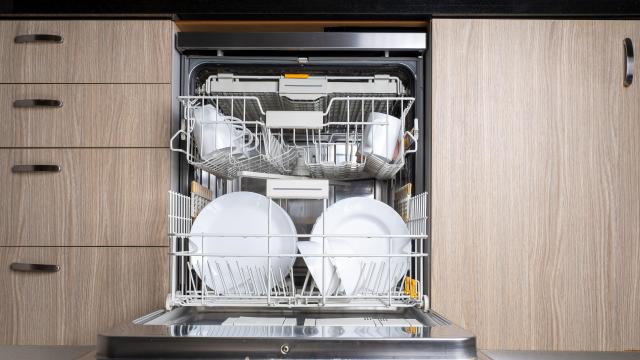I hate washing dishes, and buying dishwashing supplies. Two types of soap seems like overkill, yet it is impossible to keep a clean kitchen without dishwashing liquid (for hand washing) and dishwashing detergent (for the dishwasher). If you feel similarly, you might be tempted to try this viral dishwashing detergent hack, but please, do not do this.
The hack, which has been around for a while but was recently shared by the popular Instagram account, @brunchwithbabs (who I usually stan!), involves mixing three drops of Dawn dishwashing liquid with three tablespoons of baking soda to create and ersatz detergent powder. It is, however, a terrible idea.
On a chemical level, Dawn and dishwashing detergent are formulated to work in completely different ways. Dawn (and other similar liquids) rely on manual scrubbing and pH-neutral surfactants, while detergents made for the dishwasher rely on enzymes and a little bit of bleach to sterilise dishes.
Four years ago, when this hack first peeked its head into popularity, The Kitchn reached out to Travis Robertson, knowledge manager at Sears Home Services, and Dirk Sappok, head of product development at Miele, to get their take:
“Dishwasher detergents are designed specifically for the wash action found in a dishwasher,” says Robertson. “They have to break down grease and food oils but also be very low sudsing. They contain chemicals with a high pH and often small amounts of chlorine bleach.” What that means is that these detergents do a great job at cleaning dishes, but would be too harsh to use for hand-washing dishes…Sappok explains further: “The mixture of surfactants and enzymes is significantly different between the two. There’s mechanical action when you’re washing with your hands. In a dishwasher, the enzymes are critical to break down the soiling in the absence of the mechanical motions.”
Then there is the problem of suds. Even a small amount of Dawn can create a large amount of bubbles, and those bubbles can fill the washer, making it hard (or impossible) for the spraying mechanisms to wash the surfactant off completely. The suds can leak out of your machine, leave a residue on your dishes, or — worst case scenario — damage your dishwasher and void your warranty.
Luckily, the “hack” here is simple: Just buy and use dishwashing detergent, and don’t try to make your own. Chemistry is real, pH matters, and not all surfactants are created equally.

Leave a Reply
You must be logged in to post a comment.